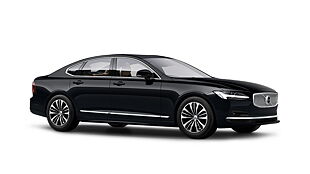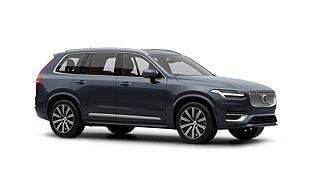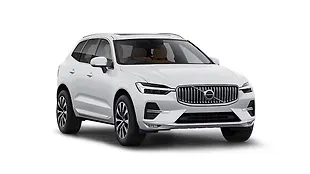Why would I buy it?
- Exhilarating acceleration
- Good looks, tasteful interiors, built quality
- High on safety and features
Why should I avoid it?
- Cramped second-row space
- Not the best sales and service network
- Well-established alternatives
Summary

Volvo Cars plans on going carbon neutral by 2040 and having an all-electric car portfolio by 2030. As they say, the journey of a thousand miles begins with a single step, and XC40 Recharge is that step for Volvo Cars. It is the first-ever pure-electric offering from the Swedish carmaker in our country and will go on sale later this year. While internationally the XC40 Recharge comes in two versions — a single-motor 230bhp front-wheel-drive and a 400bhp dual-motor all-wheel-drive, the India-spec model is the latter one, which holds back nothing and offers remarkable straight-line performance. We have driven it to find all about it.

Engine and Performance
9 / 10

The electric XC40 makes use of a 75kWh battery pack sending power to two motors - one on each axle making it AWD. The combined output from both the motors is equal to 300kW (around 402bhp) and 660Nm that’s capable of sending the XC40 from a standstill to a 100kmph in just 4.9 seconds. Now these numbers tell you only half the story of the XC40’s calibre. But before that, we’ll talk about its quirky startup procedure – or rather the lack of it.

There’s no start/stop button anymore. You take your place behind the steering (with the keys on you, of course), the car senses a driver on the seat, you hold the brake pedal, slot the gear selector to D and off you go. All the starting and ignition procedures are eliminated. It has its weird flaws though (like you can’t have the AC running if no one is sitting in the driver’s seat) and takes time to get used to. But once you do get used to it, driving a conventional car will feel monotonous.

Secondly, it’s the acceleration. No matter what speed you are doing, just an aggressive dab on the throttle shoves you and your passengers deep into the seats with its neck-snapping pace. You can feel the rear squat down, nose lifting slightly skywards and boom, its shoots forward like an arrow from the bow. The calibration for acceleration is instantaneous rather than progressive. It feels maddeningly quick and is a lot of fun behind the wheel. Yet, go gentle with the throttle and the momentum is gradual and the speed mounts up effortlessly. It’s quick no doubt with almost 400 horsepower at disposal yet it never bares its teeth at you when driven sedately in the city. This is good; especially considering the XC40’s size and weight – to give you a perspective – the Mercedes-Benz EQC has similar output but weighs almost 300kg more.

There are no fancy drive modes in the XC40 Recharge, nor is there a control for adjusting the braking recuperation. But what you do get is the ‘one pedal’ system, which is seen on many modern-day EVs. In the one pedal mode, you can drive around with just the accelerator pedal – where the vehicle starts to decelerate as soon as you let go of the accelerator. It takes some time to get used to, and sometimes the automatic deceleration causes abrupt jerks and sudden halts at low speeds. But it’s a new learning experience nonetheless and quite fun when you get hang of it.

Cruising on the highway with the XC40 Recharge is as effortless and conventional as it can get. Even with four on board, there is never a dull moment behind the wheel when doing highway speeds. Further helping the long hauls is the Google-based interface that gives out the charge percentage that would be remaining at the end of the trip along with usual details like ETA and distance. Volvo claims a range of 417 kilometres but that’s under the WLTP cycle. The realistic range under Indian conditions can be expected around 300kms, but we’ll test it later in our Road Test.

Lastly, the XC40 Recharge supports up to 150kW of charging capacity, where it will go from 10 to 80 per cent in 32 minutes with the DC fast charger. On a 30kW/50kW charger that’s usually available in India it would take little more than two hours for a full charge. Meanwhile, the 11kW portable charger will fully charge in seven hours.
Ride and Handling
8 / 10

Tipping the scale at 2188 kilograms, the XC40 isn’t a light car, but it does a good job of masking all its weight. Riding on 235/50 section Pirelli tyres wrapped around 19-inch alloy wheels, the XC40 has a compliant ride that absorbs bumps and creases quite well. But you hear the suspension more than you feel the irregularities in the cabin. Even the occasional sharped-edged sections don’t send a thud on the inside but the passengers can hear the suspension going about its job. At slow speeds, it rounds off the bumpy sections nicely and at highway speeds, it manages to remain flat over undulations settling quickly rather than weaving up and down.

We weren’t able to show corners to the XC40 Recharge, that’s something for another day. Meanwhile, the steering is light and progressive and going two and a half turns lock to lock, it’s fairly quick to respond. There’s also a mode where you can add weight to the steering but that added weight is barely noticeable on the move. We liked the brakes on the electric XC40 which had a strong bite right from the word go and despite repeated regular hard braking on our shoot in mid-summer Delhi afternoon they didn’t show any sign of fade.
Interior Space and Practicality
7 / 10

Apart from an all-digital instrument cluster, there are no noticeable changes inside the cabin of the XC40 Recharge. With Volvo going sustainable, there’s no leather inside the cabin, but they have used good quality upholstery with a hint of Alcantara. It also makes use of recycled materials on the inside for stuff like carpets, headliners, and more. It’s an all-black cabin that can make it feel a bit more cramped than it is. Dominating the centre console is the signature setup of a nine-inch vertically-staked screen flanked by air-con vents.

There are soft-touch materials used all around and even the quality of plastic and other materials seem like they are built to last. What’s lovable are the glowing lights on the door pads which add a sense of premiumness. Visibility all around is good and it’s further helped by a 360-degree camera (which isn’t available on standard XC40).

Even the seats are large and supportive with electric adjustments for the front passengers. Finding a good driving position is easy courtesy of reach-rake steering adjust. No ventilated seats here but spending long hours in front seats shouldn’t be a problem. However, the same cannot be said for the second row. The narrow rear doors aren’t comfortable to get in and out of. And short seat base of the rear bench leaves you wanting for under-thigh support. Although, you get sufficient head and knee room the tapered window line isn’t any help. And it’s only suitable for two at the back.

Lastly, the boot space of 432 litres in the standard XC40 is down to 419 litres. And the space-saver at the back eats up more of the available space. Thankfully you get 60:40 folding split seats at the back and folding it down liberates cargo space of close to 1400litres. Lest we forget, there’s a 31litres of ‘frunk’ as well and it’s good enough to carry a large duffle bag apart from the portable charging cable.
Features and Equipment
8 / 10

Although it gets an all-digital instrument cluster, the display isn’t configurable and you only get one screen with navigation and a pop-up window for trip details. Even the centre console screen is Android-based so it can make use of the Google services along with new-age connectivity features. This touchscreen is one of the quickest in business and has a good touch response with a facility of OTA update.

Other features include a panoramic sunroof, Thor’s hammer LED headlamps, dual-zone climate control, wireless charger, 360-degree camera, powered front seats, auto-dimming mirrors, PM2.5 air purifier and ambient lighting. There’s also a 600W, 13 speaker Harman Kardon music system as part of the package. This being Volvo, it is high on safety as well. Meanwhile, the driver-assist hardware includes blind-spot warning, lane keep assist, cross-traffic alert with auto brakes, and automatic brake assist.
Conclusion
8 / 10

For the XC40 Recharge, Volvo will be opening bookings three months from now in July. And deliveries are slated to commence not before October 2022. With this long game, the Swedish carmaker wants to showcase the XC40 Recharge to prospective buyers and familiarise them with the EV nature of their baby crossover.

And when it will hit the streets, the XC40 Recharge will be a straight alternative to the Mercedes-Benz EQC, Audi E-Tron, Jaguar I-Pace and BMW iX. But all these rivals are expensive with starting price north of Rs 1 crore and yet they are less powerful than the XC40. A recent leak on the website hints at an aggressive pricing proposition for the XC40 electric, and if Volvo manages to come through with that starting price, the giggle-inducing XC40 Recharge might hit the nail right on the head.

Pictures by Kaustubh Gandhi

![Volvo XC40 Recharge [2022-2024] Right Front Three Quarter Volvo XC40 Recharge [2022-2024] Right Front Three Quarter](https://imgd.aeplcdn.com/642x361/n/cw/ec/115481/volvo-xc40-recharge-right-front-three-quarter0.jpeg?isig=0&wm=1&q=80)
![Volvo XC40 Recharge [2022-2024] Right Front Three Quarter Volvo XC40 Recharge [2022-2024] Right Front Three Quarter](https://imgd.aeplcdn.com/642x361/n/cw/ec/115481/volvo-xc40-recharge-right-front-three-quarter31.jpeg?isig=0&wm=1&q=80)
![Volvo XC40 Recharge [2022-2024] Right Front Three Quarter Volvo XC40 Recharge [2022-2024] Right Front Three Quarter](https://imgd.aeplcdn.com/642x361/n/cw/ec/115481/volvo-xc40-recharge-right-front-three-quarter36.jpeg?isig=0&wm=1&q=80)
![Volvo XC40 Recharge [2022-2024] Right Front Three Quarter Volvo XC40 Recharge [2022-2024] Right Front Three Quarter](https://imgd.aeplcdn.com/642x361/n/cw/ec/115481/volvo-xc40-recharge-right-front-three-quarter34.jpeg?isig=0&wm=1&q=80)
![Volvo XC40 Recharge [2022-2024] Right Side View Volvo XC40 Recharge [2022-2024] Right Side View](https://imgd.aeplcdn.com/642x361/n/cw/ec/115481/volvo-xc40-recharge-right-side-view8.jpeg?isig=0&wm=1&q=80)
![Volvo XC40 Recharge [2022-2024] Right Rear Three Quarter Volvo XC40 Recharge [2022-2024] Right Rear Three Quarter](https://imgd.aeplcdn.com/642x361/n/cw/ec/115481/volvo-xc40-recharge-right-rear-three-quarter32.jpeg?isig=0&wm=1&q=80)
![Volvo XC40 Recharge [2022-2024] Right Rear Three Quarter Volvo XC40 Recharge [2022-2024] Right Rear Three Quarter](https://imgd.aeplcdn.com/642x361/n/cw/ec/115481/volvo-xc40-recharge-right-rear-three-quarter22.jpeg?isig=0&wm=1&q=80)
![Volvo XC40 Recharge [2022-2024] Rear View Volvo XC40 Recharge [2022-2024] Rear View](https://imgd.aeplcdn.com/642x361/n/cw/ec/115481/volvo-xc40-recharge-rear-view13.jpeg?isig=0&wm=1&q=80)
![Volvo XC40 Recharge [2022-2024] Image Volvo XC40 Recharge [2022-2024] Image](https://imgd.aeplcdn.com/272x153/n/cw/ec/51766/xc40-recharge-exterior-right-front-three-quarter-2.jpeg?isig=0&q=80)
























